rite of christian initiation of adults pdf
- by stefanie
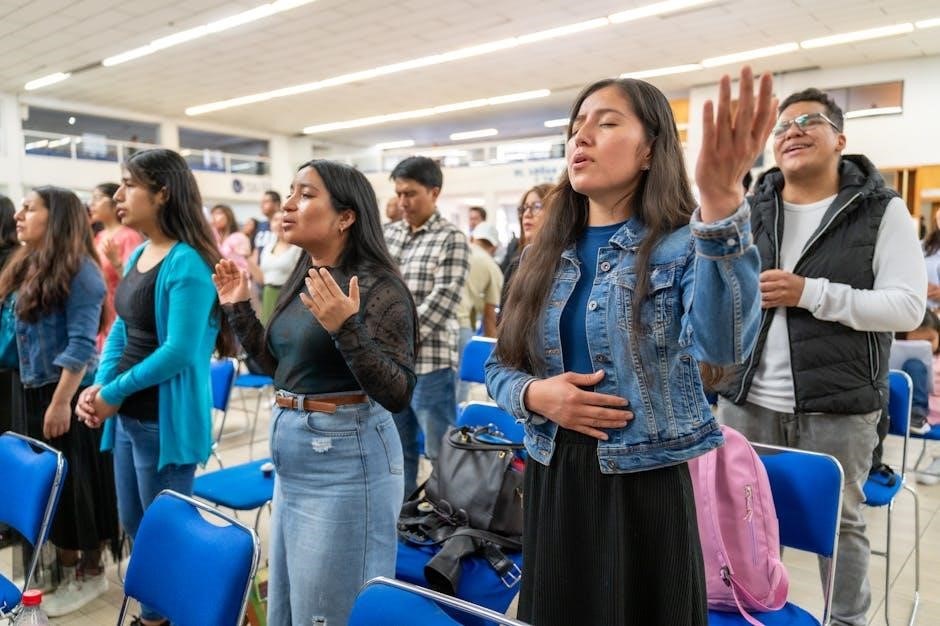
The Rite of Christian Initiation of Adults (RCIA) is a significant journey of faith, conversion, and initiation into the Catholic Church, designed for adults seeking baptism or full communion. It emphasizes spiritual formation, liturgical rites, and community support, culminating in the Easter sacraments. The process fosters a welcoming environment, guiding individuals toward a deeper relationship with Christ and the Church.
1.1 Overview of the RCIA Process
The RCIA process is a structured journey guiding adults toward full initiation into the Catholic Church. It begins with the Precatechumenate, a period of inquiry where individuals explore the faith. This leads to the Catechumenate, focused on spiritual formation and doctrine. The Period of Purification and Enlightenment prepares candidates for the sacraments through reflection and prayer. Finally, initiation occurs at Easter, where adults receive Baptism, Confirmation, and Eucharist. The process emphasizes community support, liturgical rites, and personal conversion, ensuring a holistic approach to faith integration. It is tailored to individual needs, fostering a deep encounter with Christ and the Church.
1;2 Historical Context and Development of RCIA
The Rite of Christian Initiation of Adults (RCIA) traces its roots to the early Church’s catechumenate, a process for initiating new members. Revitalized by the Second Vatican Council, RCIA was formally restored in 1972 to address the spiritual needs of modern adults. It reflects the Church’s renewed emphasis on liturgical renewal and the importance of community in faith formation. Rooted in ancient traditions yet adapted for contemporary contexts, RCIA serves as a dynamic process to guide individuals into full communion with the Catholic Church, emphasizing conversion, prayer, and sacramental life. Its development underscores the Church’s commitment to integrating faith and life in a changing world.
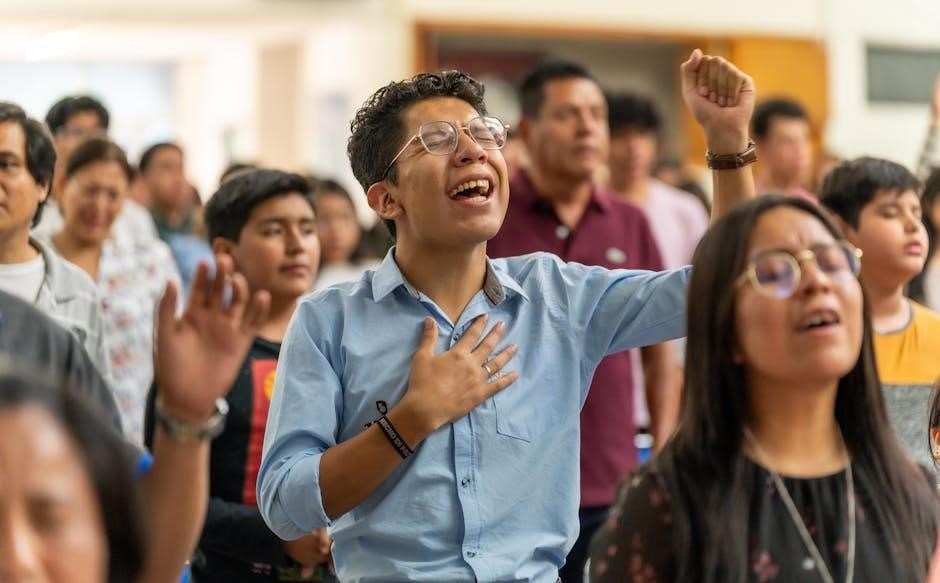
Key Stages of the RCIA Process
The RCIA process includes four key stages: Precatechumenate (inquiry), Catechumenate (formation), Purification and Enlightenment (preparation), and Initiation (Easter sacraments), guiding adults toward full Catholic communion.
2.1 Precatechumenate: The Period of Inquiry
The Precatechumenate is the initial stage of the RCIA process, where individuals express interest in the Catholic faith. It is a time of exploration and introduction to Catholic teachings, allowing inquirers to ask questions and discern their readiness for further commitment. This period emphasizes hospitality and building relationships with the parish community.
During this stage, the RCIA team provides a welcoming environment and basic formation, helping inquirers understand the Catholic Church’s beliefs and practices. The duration is flexible, adapting to the individual’s needs, and concludes when the person is ready to move to the next stage, the Catechumenate.
2.2 Catechumenate: The Period of Formation
The Catechumenate is the second stage of the RCIA process, focusing on deepening the faith of those who have committed to becoming Catholic. During this period, participants engage in regular catechetical sessions, exploring Catholic doctrine, Scripture, and traditions. The RCIA team provides structured formation, emphasizing prayer, liturgical catechesis, and the role of the Church in daily life. This stage is tailored to the needs of each individual, fostering spiritual growth and a personal relationship with Christ. The Catechumenate culminates in the Rite of Election, where the catechumens publicly declare their intention to receive the sacraments of initiation. This period is marked by community support and spiritual enrichment.
2.3 Purification and Enlightenment: The Period of Purification
The Period of Purification and Enlightenment occurs during Lent, preparing catechumens for the Easter sacraments. This stage focuses on spiritual cleansing, deepening faith, and discernment. The Rite of Scrutinies is celebrated, involving prayers for the catechumens, seeking healing, strength, and enlightenment. These rites emphasize repentance and conversion, aligning their lives with Christ’s teachings. The period also includes reflection on the Creed and the Lord’s Prayer, fostering a deeper understanding of Catholic beliefs. The community’s prayers and support accompany the catechumens as they prepare to embrace their new life in the Church, culminating in the Easter Vigil.
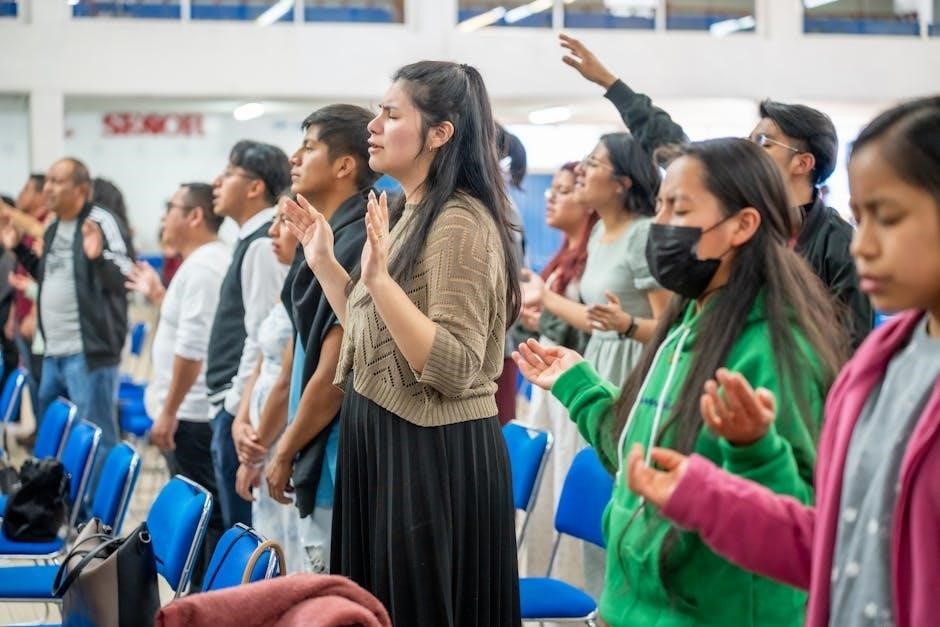
2.4 Initiation: The Easter Sacraments
The Easter Sacraments mark the culmination of the RCIA journey, typically celebrated at the Easter Vigil. Catechumens receive Baptism, Confirmation, and the Eucharist, fully initiating them into the Catholic Church. Baptism cleanses them from sin, while Confirmation strengthens their faith and seals them with the Holy Spirit. The Eucharist unites them with Christ and the Church. The Vigil’s liturgy is rich with symbolism, including the Paschal Candle and the renewal of baptismal promises, signifying new life in Christ. This sacred night is a joyous celebration for the entire parish, welcoming new members into the Church’s family.
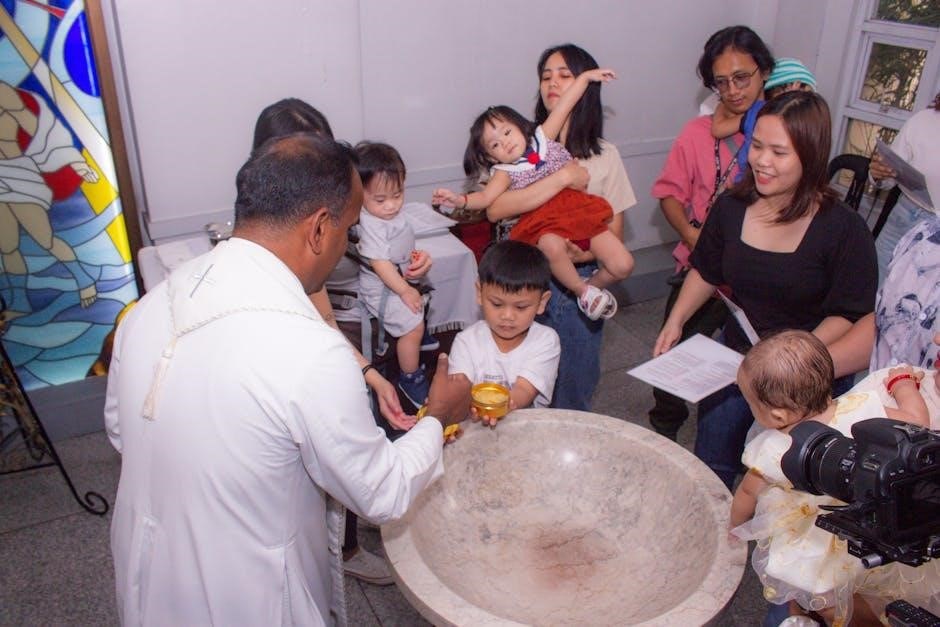
The Role of the Parish Community in RCIA
The parish community plays a vital role in RCIA by providing hospitality, support, and spiritual guidance. The RCIA team ensures a welcoming environment, fostering faith growth and community involvement;
3.1 The RCIA Team and Their Responsibilities
The RCIA team is essential in guiding adults through their faith journey. Responsibilities include implementing the RCIA process, fostering a welcoming environment, and providing spiritual support. The team ensures a personalized approach, adapting to the needs of each candidate. They collaborate with the parish community to create a nurturing atmosphere for growth. The team also develops and distributes resources, such as handbooks and guides, to aid in formation. Their role is to accompany candidates through prayer, catechesis, and liturgical experiences, ensuring a meaningful transition into the Catholic Church. The team’s dedication enriches the candidates’ journey, helping them deepen their faith and integration into the Church.

3.2 Hospitality and Welcoming Environment
Hospitality is a cornerstone of the RCIA process, ensuring that inquirers feel welcome and supported. The parish community plays a vital role in creating a warm and inclusive atmosphere, helping candidates feel at ease as they explore the Catholic faith. This environment fosters trust and openness, allowing individuals to comfortably ask questions and share their experiences. The RCIA team and parish members are encouraged to extend genuine kindness, patience, and understanding. A welcoming space, both physically and spiritually, is essential for the journey of conversion, helping candidates build meaningful connections with the Church and its people.
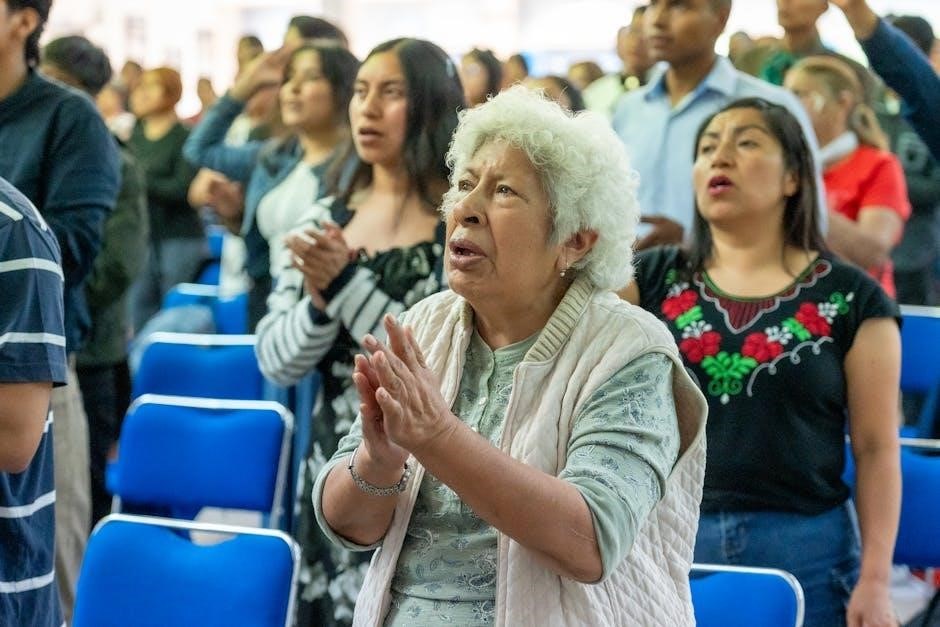
Spiritual Development and Formation
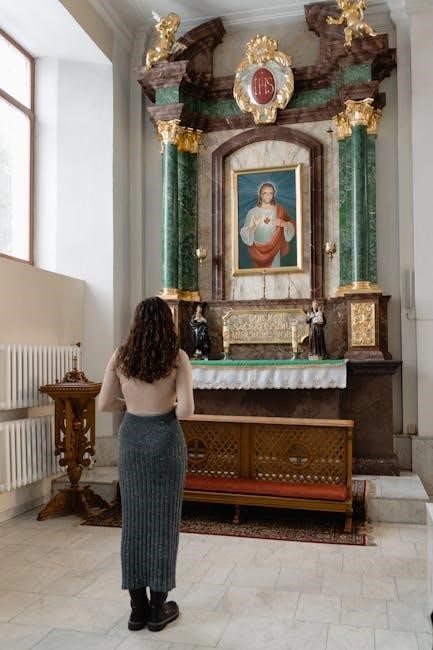
The RCIA emphasizes prayer, liturgical catechesis, and reflection to deepen faith. It uses the Catechism of the Catholic Church as a foundational resource for spiritual growth and understanding.
4.1 Prayer and Liturgical Catechesis
Prayer and liturgical catechesis are integral to the RCIA journey, fostering a deep connection with Christ. Through prayer, participants encounter God’s presence, while liturgical catechesis immerses them in the Church’s rituals and teachings. The process emphasizes the liturgical cycle, with readings and reflections aligned to the Church’s seasonal celebrations. This approach helps candidates connect their spiritual growth to the life of the Church. The Catechism of the Catholic Church serves as a key resource, providing doctrinal clarity and enriching the formation experience. Prayer and liturgical catechesis together create a holistic environment for spiritual transformation and sacramental preparation.
4.2 The Role of the Catechism of the Catholic Church
The Catechism of the Catholic Church (CCC) serves as a foundational resource in the RCIA process, providing a comprehensive and systematic presentation of Catholic doctrine. It aids candidates in understanding the Church’s teachings on faith, morals, and prayer, offering clarity and depth to their spiritual journey. The CCC is referenced throughout the RCIA to align formation with the Church’s official teachings. Its structure, divided into sections on the Creed, Sacraments, Morality, and Prayer, complements the liturgical and catechetical dimensions of the RCIA. This ensures that candidates receive a well-rounded understanding of Catholic beliefs and practices, fostering a lifelong commitment to the faith.

Resources and Materials for RCIA
RCIA handbooks, manuals, and online resources provide essential guidance for participants and facilitators. These materials include catechetical content, liturgical guides, and practical tools to support the initiation journey effectively.
5.1 RCIA Handbooks and Manuals
RCIA handbooks and manuals are essential resources for guiding participants and facilitators through the initiation process. These materials provide detailed catechetical content, liturgical guidelines, and practical tools to support spiritual formation. Handbooks often include prayer resources, session outlines, and faith formation guides tailored for adults. Manuals typically offer step-by-step instructions for implementing the RCIA process, ensuring consistency and fidelity to the Church’s teachings. Examples like the St. Matthew Catholic Church RCIA Handbook and military chaplain resources emphasize systematic faith presentation. These resources help create a structured yet flexible framework, fostering a welcoming and transformative experience for those journeying toward full communion with the Catholic Church.
5.2 Online Resources and PDF Guides
Online resources and PDF guides provide accessible and comprehensive support for the RCIA process. Websites like Liturgy Office and RCIA.link offer downloadable materials, including the official Rite of Christian Initiation of Adults document. PDF guides such as “The Catechumenate” and “RCIA Handbook” are widely used for faith formation and liturgical preparation. These resources often include catechetical content, prayer aids, and step-by-step instructions for facilitators. Online platforms also offer customizable templates and session plans, catering to diverse parish needs. These digital tools enhance the RCIA experience, ensuring a well-structured and spiritually enriching journey for both participants and leaders.
The Rite of Christian Initiation of Adults is a transformative journey of faith and conversion, deeply rooted in community and spiritual growth, vital in modern Catholic life.
6.1 The Significance of RCIA in Modern Catholic Life
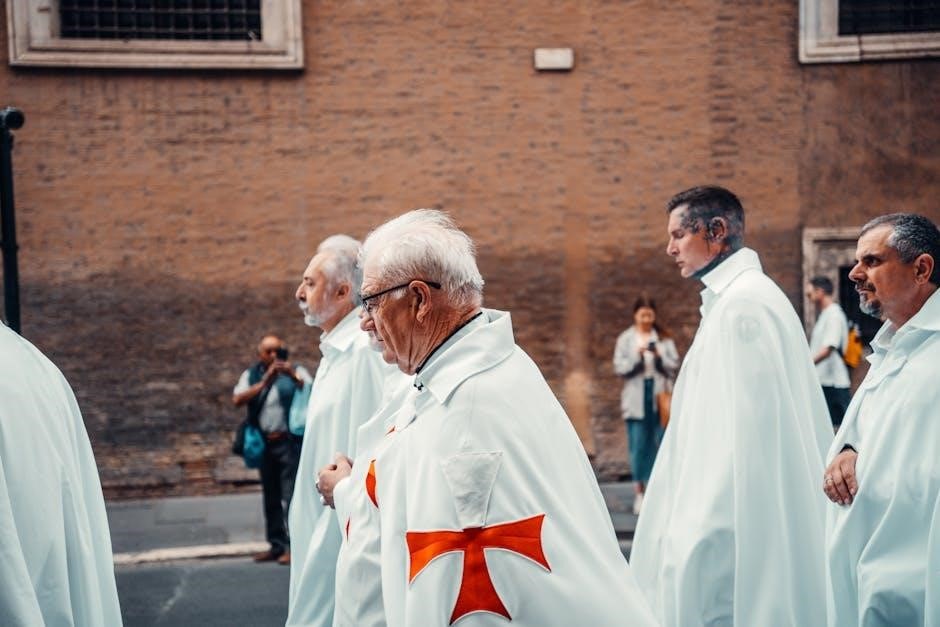
The Rite of Christian Initiation of Adults holds profound significance in modern Catholic life, offering a structured and spiritual journey for individuals seeking faith formation. By fostering a welcoming and supportive environment, RCIA emphasizes the importance of community and hospitality in the Church. It provides a comprehensive process for adults to deepen their understanding of Catholic teachings, fostering personal conversion and a lifelong commitment to faith. As a foundational sacramental process, RCIA not only enriches individual lives but also revitalizes the Church, ensuring its mission and traditions continue to thrive in contemporary society. Its adaptability and focus on spiritual growth make it indispensable in today’s diverse and ever-changing world.
Related posts:
Discover the Rite of Christian Initiation of Adults with our comprehensive RCIA guide. Perfect for faith formation and sacramental preparation.
Posted in PDF